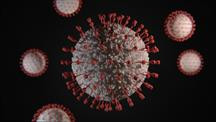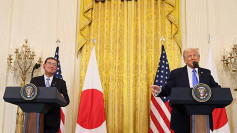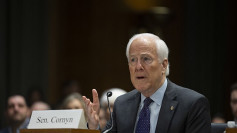As the U.S. enters the Christmas season, a new COVID-19 variant, known as JN.1, is rapidly spreading across the country, potentially leading to an increase in infections this winter. Meanwhile, interest in vaccination among Americans appears to be waning.
On December 24, media outlets reported that according to data from the Centers for Disease Control and Prevention (CDC) this week, the JN.1 strain, a subvariant of the Omicron variant of the coronavirus, has additional mutations on its spike protein and is highly transmissible. The proportion of U.S. COVID-19 cases involving the JN.1 variant has quickly risen to over 44%, with its spread doubling in just two weeks.
The JN.1 variant is spreading widely across several countries. The UN health body has reported that cases of JN.1 have been found in 41 countries, primarily in France, the U.S., Singapore, Canada, the U.K., and Sweden.
On Tuesday, the World Health Organization (WHO) classified it as a "variant of interest," noting that while it is spreading rapidly worldwide, it is currently considered to pose a lower risk to global health.
The risk of infection may increase during the winter, typically a peak season for respiratory diseases. Increased indoor activities during this time could lead to a further rise in infections.
Carlos Malvestutto, an associate professor of infectious diseases at the Ohio State University Wexner Medical Center, stated that the return of the flu season, the prevalence of the Respiratory Syncytial Virus (RSV), and the tendency for people to gather indoors during winter could lead to an increase in infections.
The number of deaths from COVID-19 has significantly decreased. According to the CDC, during the peak of the pandemic in early January 2021, there were nearly 26,000 deaths in a week. For instance, compared to the same period last year, the number of deaths has significantly dropped. For the week ending December 16 this year, there were 716 deaths, compared to 3,186 in the same period last year.
Malvestutto mentioned that while the mortality and hospitalization rates for the JN.1 variant have not reached the high levels seen with the Delta variant, there has been an increase.
At the same time, despite a 10.4% week-over-week increase in U.S. COVID-19 hospitalizations, there has been a 30% decrease compared to the same period last year.
Malvestutto emphasized the need for vigilance, as COVID-19 remains a serious threat to many people and can lead to death.
The U.S. government and health agencies are working to promote the latest vaccine shots. Major chain pharmacies like CVS and Walgreens are taking steps to increase vaccination rates. The CDC has noted that these latest vaccines are effective in preventing severe illness and death caused by the JN.1 variant and other prevalent strains.
Some pharmacy staff have complained about being pressured by their stores and offered bonuses to encourage customers to get vaccinated.
However, the public seems less enthusiastic about getting vaccinated. According to the CDC, only about 18% of U.S. adults have received the latest COVID-19 vaccine for the 2023-2024 season.
Malvestutto noted that since the peak of the pandemic, there has been a significant decline in the U.S. public's attention to COVID-19 prevention measures, including getting updated vaccines and wearing masks.
In recent months, all COVID-19 patients he has seen in the hospital had not received the latest vaccine.
As the vaccine market's profitability diminishes, companies like Pfizer are trying to explore new revenue streams, such as the anti-obesity drug market. However, in transitioning to new markets, these companies have encountered issues like drug side effects.
Meanwhile, vaccine manufacturers like Pfizer, BioNTech, Moderna, and Johnson & Johnson, which performed well in terms of stock prices early in the pandemic, have underperformed this year while the S&P 500 index is near its historical high.
Last week, Pfizer lowered its revenue forecast for 2024 and added a $500 million cost-cutting plan.






